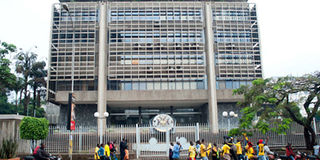Bank of Uganda stuck with Shs11b in unclaimed cash

Billions of unclaimed balances have been accumulating at the central bank since the enactment of the FIA 2004.
What you need to know:
Although billions have been returned to the central bank, it is difficult to establish what the central bank does with this money since it has been accumulating over the years.
Every year, banks publish hundreds of individual or group dormant accounts that remain inactive for at least two years.
The law stipulates that if an account holder does not go back to the bank to claim this money, it is sent to Bank of Uganda (BoU). This amount of money, according to BoU had by December 2014 accumulated to Shs10.9b.
Christine Alupo, the BoU director for communications confirmed to this newspaper that they are holding the money as required by the law.
According to the Financial Institutions Act (FIA) 2004, commercial banks are required to send all money on inactive accounts to BoU after a period of five years. Alupo, however plays down the size of the unclaimed balances, saying this is small money when compared to overall deposits in commercial banks.
“Put in context, the Shs10.9b is a negligible 0.08 per cent of total commercial bank deposits as at end of December 2014, given that the aggregate balance held in banks by end of December, 2014 was Shs13.3 trillion,” she says.
For various reasons, account holders such as such Stephen Tashobya, who used to hold an account with Global Trust Bank, which was closed, leave banks for various reasons.
“It was mainly a transactional account and I needed a loan. So I moved to Barclays Bank because of the salary loan rates being low and I abandoned the Global Trust Bank account with about Shs50,000 on it,” he says.
But at some point, five years from 2014, part of this money will move to the BoU after Dfcu (which was awarded loans and deposits for Global Trust Bank) has deducted its monthly management expenses.
The FIA Act 2004 also stipulates that an account holder can still claim the money once it is sent to BoU, but this must be through a legal process. “The central bank shall refund unclaimed balances to depositors if they make a legal request for the funds,” the Act reads in part.
What remains unclear though, is what this money does while at BoU. Alupo had by press time not responded to our requests to furnish us with details of what this money is used for.
This amount has been growing year-on-year at least since 2009, five years after the FIA 2004 was enacted.
The number of dormant accounts varies from one bank to another. The balances left on individual and company accounts also differ. The amounts, according to industry sources, could be as low as Shs100 and as high as more than Shs100,000.
This is also dependent on the minimum balance required for a specific account.
John Mwesigye, the chief information officer at Standard Chartered Bank, says they always make effort to notify dormant account holders before the transfer is made but sometimes fail to get to the holders.
“Three years from the date of dormancy [five years of inactivity], the account is tagged as unclaimed, and at this point the bank advertises in print media notifying the public about the dormancy of the account,” he says.
“Unclaimed accounts can be reactivated by the owners upon positive identification. Relevant processes / procedures will apply,” he adds.
There are also unclaimed dividends from listed companies. Stanbic Bank couldn’t disclose how much it had withheld as unclaimed with Fred Mugisha Bantu; the bank’s communications manager saying: “We cannot disclose the amount in unclaimed dividends.”
Mobile money
In Kenya, the Unclaimed Financial Assets Authority had by November 2014 received Shs30b from banks in unclaimed balances. Safaricom, which operates M-Pesa, submitted at least Shs15.6b in unclaimed balances to the authority recently.
Back here (Uganda) debate over where unclaimed mobile money has been building. MTN Uganda, whose escrow account is managed by Stanbic Bank, has an excess of Shs18.6b, according to officials from both companies.
Considering that BoU regulates mobile money through having commercial banks hold escrow accounts on behalf of the telecoms, this unclaimed money – after five years – is supposed to be sent to BoU.
“The rules that govern bank accounts govern unclaimed balances and none of this money sits at MTN,” says Patrick Mweheire, the Stanbic chief executive officer.
“If a registered customer receives this money and doesn’t use it for a period of time, the FIA guidelines demand that the money is handed over to BoU,” Anthony Katamba, the MTN general manager for corporate services and chief legal counsel, says.




